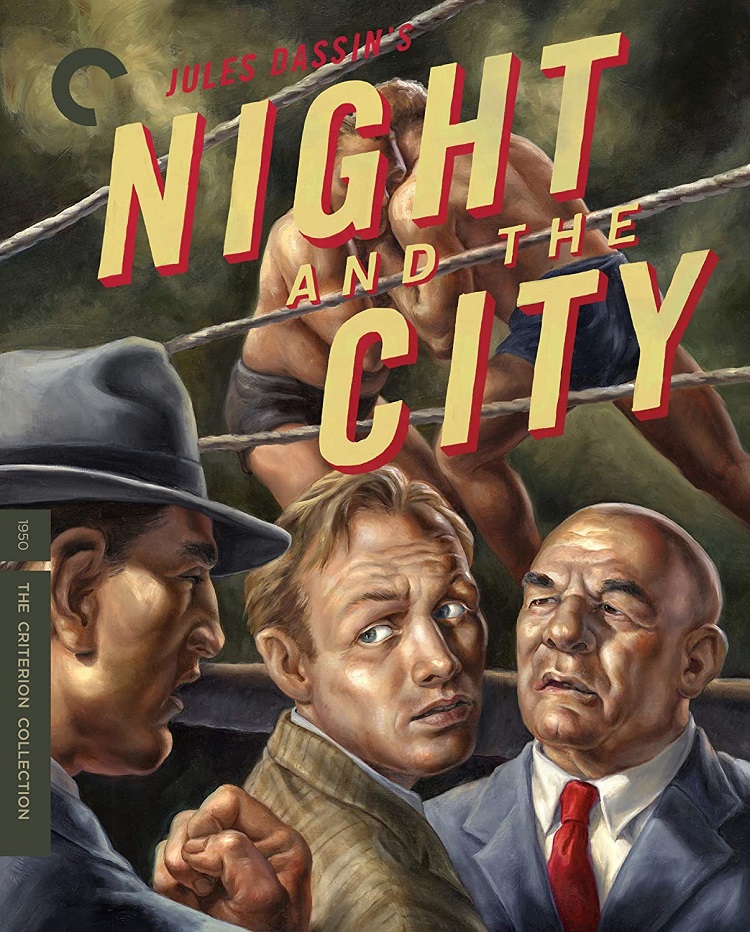
Based on the novel of the same name by Gerald Kersh, although director Jules Dassin claims never to have read it, Night and the City tells the story of Harry Fabian (Richard Widmark), a con man who wants “to be somebody,” but isn’t because he’s not as smart as he thinks he is. The Criterion Collection presents both the U.S. version with a score by Franz Waxman and the UK version, which is five minutes longer, and has a score by Benjamin Frankel.
This London noir opens with Harry on the run through darkened streets and shadowy alleyways, likely a frequent occurrence for the character considering what transpires. He shows up at the apartment of his gal Mary (Gene Tierney), who has not seen or heard from him for three days. Harry wants £300 from her to invest in a racetrack, allegedly, and has no qualms about stealing money from her purse.
Kristo (Herbert Lom) runs the London wrestling circuit, though his methods may not always be legal. His father, famous Greek wrestler Gregorius the Great (Stanislaus Zbyszko), doesn’t like the fake wrestling shows Kristo promotes. Playing on the old man’s dignity and love of the sport, Harry gets a doozy of an idea. In partnership with Gregorius, as protection from Kristo, they are going to conduct legitimate wrestling matches.
However, Harry needs to raise £400 to cover expenses. He asks his boss Phil (Francis L. Sullivan), owner of the Silver Fox nightclub, who offers to match half on the assumption Harry will fail based on his track record. Unbeknownst to Phil, his wife Helen (Googie Withers) wants to leave him, so she gives Harry £200, which is supposed to get her a license to run her own nightclub.
Kristo gets word about Harry’s plan and isn’t happy about it. He stops Phil from following through, causing Harry to hustle and improvise to keep the match afloat. Unfortunately for him and a few around him, nearly decision makes Harry turns out badly, eventually leading to a bounty that has the whole London underworld looking for him.
Widmark is marvelous as Harry. Rather than the frequently seen cool, cunning hustler character that populates so many stories, Harry is flawed because he doesn’t think things through. He can’t see beyond his immediate needs, so he is willing to use people rather than take into account the great havoc his manipulations may cause. The story reinforces Proverbs 16:18: “Pride goes before destruction, a haughty spirit before a fall.” When an opportunity for redemption appears in the final act, Harry makes a believable choice.
The video has been given a 1080p/ MPEG-4 AVC encoded transfer displayed at an aspect ratio of 1.33:1. The liner notes reveal, “this new digital transfer was created in 4K resolution on an Oxberry wet-gate film scanner from the 35mm original camera negative. The film was restored at Cineric in New York using Blackmagic Design’s DaVinci Revival, Cinnafilm’s Dark Energy, and Pixel Farm’s PFClean.” The inky blacks and wide range of grays in Max Greene’s cinematography are impressive.
Also, “the original monaural soundtrack was remastered at 24-bit from the 35mm magnetic track. Clicks, thumps, hiss, hum, and crackle were manually removed using Pro Tools HD, AudioCube’s integrated workstation, and iZotope RX4.” There’s a faint hiss and the dialogue is at a low volume. The score gets a touch too loud during chase sequence.
Dassin wasn’t involved with either editing session, and preferred the American version. The few additional scenes make minor changes to the story. For example, during the first meeting between Harry and Mary, we don’t see him sneak into her purse looking to steal money. He now looks like a foolish schemer rather than a con man. The UK edit also makes clear some portions of the plot.
On critic Glenn Erickson’s commentary, he talks about the novel, the shooting script, and both cuts of the film. “Two Version, Two Scores” (HD, 24 min) looks at the different edits and composers with film-music scholar Christopher Husted. Shot in 2004 for Criterion, director “Jules Dassin” (HD, 18 min) speaks about making the film and its reception. Taken from the 6/14/70 episode of the French TV series “L’invite du dumanche” (HD, 25 min), Dassin talks about Hollywood and relocating after being blacklisted. Also the “Theatrical Trailer” (HD, 2 min)
For those looking for classic film noirs, Night and the City is one to add to your collection by whatever means necessary.